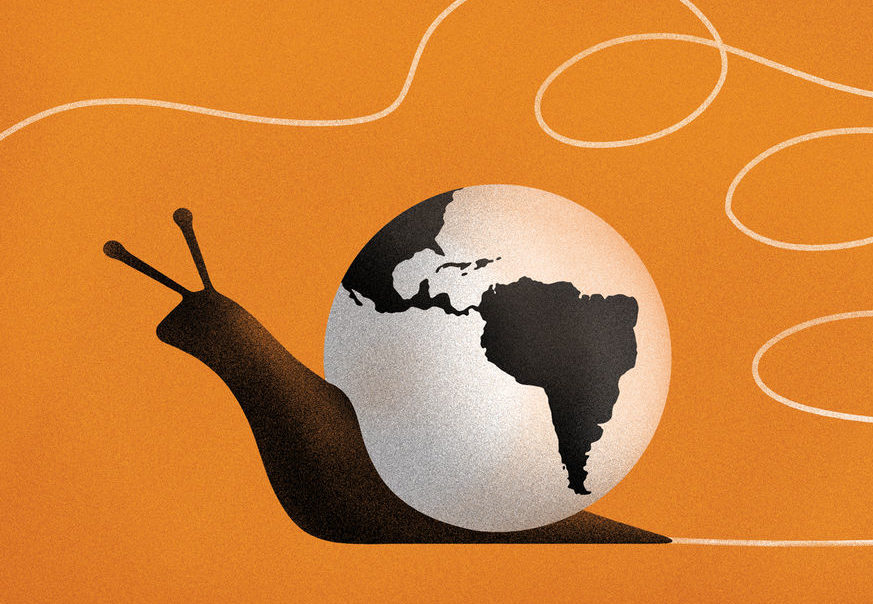RIO DE JANEIRO, BRAZIL – (Bloomberg) “I regret all the dead,” said Brazil’s President Jair Bolsonaro, who once dismissed Covid-19 as “the sniffles.” But death, he noted breezily “is everyone’s destiny.”
Few leaders in Latin America have shown such callous disregard for the health and safety of their citizens. Yet even those who took the coronavirus seriously—Chile, Argentina and Peru locked down hard and early—are now overwhelmed. The region has become the latest global epicenter of the pandemic, and the factors some speculated might spare the developing world from the worst of the virus—young populations, warm weather, fewer international travelers—have failed to slow its march.
Brazil has more infections than any country except the U.S., the world leader by far when it comes to Covid-19 infections and deaths.

But if Latin America seems to confirm the apocalyptic predictions of those who see the pandemic as the beginning of the end of emerging markets, other regions suggest a more optimistic outcome.
Let’s not forget that emerging markets in East Asia are leading the global economic recovery. Three of the giants in the MSCI Emerging Markets Index—China, South Korea and Taiwan—organized the most successful containment efforts. By doing so, they demonstrated that nothing is more important in a pandemic than government competence, which breeds trust in institutions. By contrast, faith in public institutions in Latin America has been plunging for years thanks to government corruption. Covid-19 has accelerated this downward spiral.
Of course, urban inequality contributes to this unfolding disaster. The coronavirus preys on the poor: Asking residents of Brazil’s tightly packed favelas to socially distance is a cruel joke; and for most, staying at home is untenable, since the choice is between going to work or going hungry.
India exacerbated these awful dilemmas with one of the world’s strictest lockdowns, including the suspension of bus and train services. That forced tens of millions of poor migrants to abandon city slums and return to their villages on foot. Casual laborers and their families walked hundreds of miles, carrying all of their worldly possessions in cloth bundles. Public health experts now fear an explosion of cases in rural India.
Africa, meanwhile, is holding its collective breath. Despite United Nations warnings of a potential 1.2 billion infections and 3.3 million deaths, the continent has recorded only about 150,000 Covid-19 cases so far. And food supplies are holding up, in spite of predictions from the World Food Program that, in a worst case scenario, we could see “multiple famines of biblical proportions” around the world.
But that doesn’t mean Africa has escaped. Gravediggers in Nigeria are overwhelmed and Somalia and Tanzania are hotspots. It’s also likely that infection numbers in Africa are much higher due to a lack of testing.
In the end, none of the emerging markets will be immune from the potentially devastating long-term consequences of the pandemic. Global trade is collapsing and multinationals are starting to bring home supply chains, snatching away the ladder to prosperity for the world’s poorest countries.
Meanwhile, Big Government is back in Western economies, taking over payrolls, buying stakes in companies and drawing up industrial plans. Weaker economies will be no match for this state muscle, thus dramatically widening global inequality.
Paradoxically, the more rich countries spend to pull themselves out of the abyss, the lower the interest rates they have to pay on their colossal debt. However, interest rates for emerging economies are rising as their currencies plunge. Latin America faces a debt crisis and another “lost decade.”
New economy predictions
Luis Alberto Moreno, the president of the Inter-American Development Bank, said that for Latin America, the Covid-19 crisis is “like the Spanish flu and Great Depression at the same time.” Still, he sees an opportunity to bring more manufacturing and trade back to the Americas from Asia.
But Hendrik Du Toit, chief executive of asset manager Ninety One, notes that Asia, not Latin America, dominates the emerging market universe—and the entire global economy is shifting to the region. Asia trade will continue to flourish, he predicts.
Economist Dambisa Moyo is worried that emerging economies may end up reverting to failed policies like import substitution. A confluence of inequality, climate change and debt makes for a “very lethal cocktail.” Africa, she said, needs a Marshall Plan.
However, Josephine Wapakabulo, founder and managing director of TIG Africa, notes African governments have done reasonably well in containing Covid-19 so far. She sees hope for the continent in expanded regional trade and a tech boom in e-commerce and logistics, including last-mile delivery.
Source: Bloomberg

